Photographs: Buddhika Weerasinghe/Reuters
In a path-breaking judgment, the Delhi High Court on Thursday legalised gay sex among consenting adults, holding that the law making it a criminal offence violates fundamental rights. However, Section 377 of the Indian Penal Code, which criminalises homosexuality, will continue for non-consensual and non-vaginal sex.
"We declare that Section 377 of IPC in so far as it criminalises consensual sexual acts of adults in private is violative of Articles 14, 21 and 15 of the Constitution," a bench comprising Chief Justice A P Shah and Justice S Murlidhar said.
Gay sex legalised by Delhi High Court
Image: A gay parade in DelhiPhotographs: Buddhika Weerasinghe/Reuters
The high court said, "The provision of Section 377 of the IPC will continue to govern non-consensual penile non-vaginal sex and penile non vaginal sex involving minors".
The court further clarified that "by adults we mean everyone who is 18 years of age or above".
It further said that this judgment will hold till Parliament chooses to amend the law.
Gay sex legalised by Delhi High Court
Image: A gay parade in DelhiPhotographs: Buddhika Weerasinghe/Reuters
Gay sex legalised by Delhi High Court
Image: Participants take part in a gay pride march in New DelhiPhotographs: Buddhika Weerasinghe/Reuters
It observed that the inclusiveness that the Indian society traditionally displayed in every aspect of life manifested in recognising a role in society for everyone. 'Those perceived by the majority as 'deviants' or 'different' are not on that score excluded or ostracised,' the Chief Justice, writing the judgment for the bench, said.
Where society can display inclusiveness and understanding, such persons can be assured of a life of dignity and non-discrimination, it said.
'This was the spirit behind the resolution of which Jawaharlal Nehru spoke so passionately,' the bench said, referring to the Objective Resolution moved by him on December 13, 1946 at the Constituent Assembly debate.
Gay sex legalised by Delhi High Court
Image: A gay parade in MumbaiPhotographs: A Ganesh Nadar
Quoting Nehru, Justice Shah said, 'Words are magic things often enough, even the magic of words sometimes cannot convey magic of human spirit and of a nation's passion ...(this resolution seeks very feebly to tell the world of what we have thought or dreamt of so long, and what we now hope to achieve in near future)'.
He said Nehru was of the view that the House should consider the resolution not in a spirit of narrow legal wording, but rather look at the spirit behind that resolution.
The bench was critical of the provision of section 377 of IPC holding that 'a provision of law branding one section of people as criminal based wholly on states' moral disapproval of that class goes counter to equality guaranteed in the Constitution'.
'The provision of section 377 runs counter to the constitutional values and the notion of human dignity which is considered to be cornerstone of our Constitution. Section 377 in its application to sexual act of consenting adults in privacy discriminates a section of people solely on the ground of their sexual orientation which is analogous to prohibited grounds of sex,' the bench said.
Gay sex legalised by Delhi High Court
Image: A woman holds a sign during a parade for gays and lesbian rightsPhotographs: Arko Datta/Reuters
It said that any discrimination on the grounds of sexual orientation was against Article 15 of the Constitution, which prohibits any discrimination on grounds of sex, religion, caste or place of birth.
'We hold that sexual orientation is a ground analogous to sex and that discrimination on the basis of sexual orientation is not permitted by Article 15.'
The bench pulled up the government for its stand that judiciary should refrain from interfering on the issue as it pertains to legislative function coming under the ambit of Parliament. 'We are constrained to observe that the submission of Additional Solicitor General reflect rather poorly on his understanding of the constitutional scheme.
'The judiciary is constituted as the ultimate interpreter of the Constitution and to it is assigned the delicate task of determining what is the extent and scope of the power conferred on each branch of government,' the bench said.
'A constitutional provision must be construed, not in a narrow and constricted sense, but in a wide and liberal manner so as to anticipate and take it out of changing conditions and purposes so that the Constitutional provision does not get atrophied or fossilised but remains flexible enough to meet the newly emerging problem,' the bench said, quoting a Supreme Court judgement.
Gay sex legalised by Delhi High Court
Image: Gay rights activists dance at 'Queer Pride March' in New DelhiPhotographs: Adnan Abidi/Reuters
The high court judgment assumes importance as the government was still grappling with the option to scrap section 377 from the statute. When the verdict was reserved on November 7 last, the previous UPA government had vociferously opposed scrapping of section 377 of the Indian Penal Code, which prescribes punishment up to life imprisonment for indulging in unnatural sexual acts.
There were contradictions within the government as the Home Ministry had opposed scrapping of section 377 while Ministry of Health came out openly in support of the gay rights activists.
The government later sidelined the stand of the then Health Minister Anbumani Ramadoss and opposed the PIL by describing homosexuality as 'the most indecent behaviour' in society.
The Centre had submitted that gay sex is immoral and reflection of a perverse mind and its decriminalisation would lead to moral degradation of society.
'Every citizen has the right to lead a decent and moral life in society and the right would be violated if such behaviour (gay sex) is legalised in the country,' the government had contended and added that allowing gay sex would pose a health hazard to society.
Gay sex legalised by Delhi High Court
Image: Participants hold placards during a parade for gays and lesbian rights in MumbaiPhotographs: Arko Datta/Reuters
The Centre had said that homosexuals comprise only 0.3 per cent of the population and the right of rest 99.7 per cent of the population to lead a decent and moral life in society would be violated if such behaviour (gay sex) is legalised.
Gay rights activists had contended that the government is infringing upon their fundamental right to equality by criminalising homosexual acts on the ground of morality.
'The Constitution gives fundamental right to equality and it prohibits discrimination on the basis of sex. But the rights of 25 lakh homosexuals in the country are being violated,' they had contended.
Earlier, the government had put a contradictory stand on the issue with the Home Minister of the then UPA government favouring the retention of the penal provision for homosexual acts while the Health Minister opposed the enforcement of Section 377 in cases involving consenting adults.
But when the day-to-day hearing began on the case, the government set aside the stand of the Health Ministry and opposed the plea of gay rights activists.

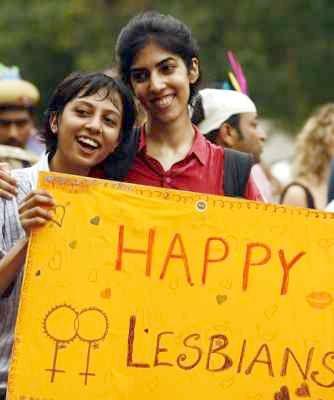
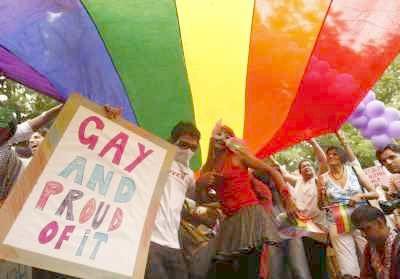

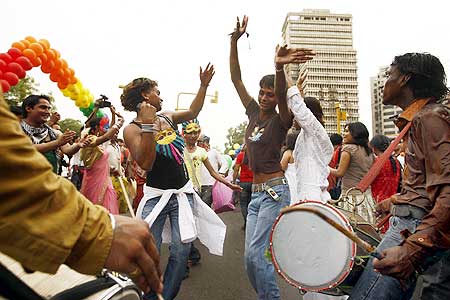
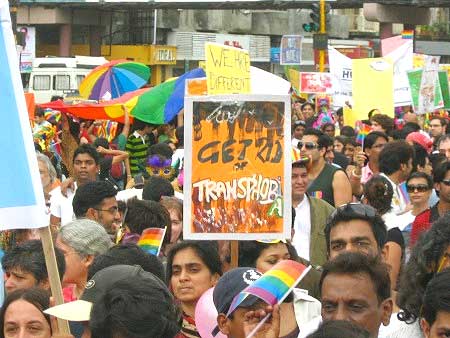
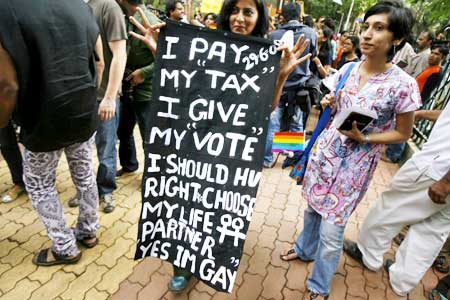
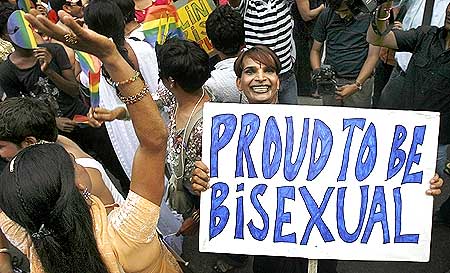

article